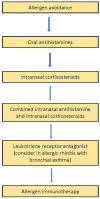Pharmacological Management of Allergic Rhinitis: A Consensus Statement from the Malaysian Society of Allergy and Immunology
- PMID: 35942430
- PMCID: PMC9356736
- DOI: 10.2147/JAA.S374346
Pharmacological Management of Allergic Rhinitis: A Consensus Statement from the Malaysian Society of Allergy and Immunology
Abstract
The goal of allergic rhinitis (AR) management is to achieve satisfactory symptom control to ensure good quality of life. Most patients with AR are currently treated with pharmacotherapy. However, knowledge gaps on the use of pharmacotherapy still exist among physicians, particularly in the primary care setting, despite the availability of guideline recommendations. Furthermore, it is common for physicians in the secondary care setting to express uncertainty regarding the use of new combination therapies like intranasal corticosteroid plus antihistamine combinations. Inadequate treatment leads to significant reduction of quality of life that affects daily activities at home, work, and school. With these concerns in mind, a practical consensus statement was developed to complement existing guidelines on the rational use of pharmacotherapy in both the primary and secondary care settings.
Keywords: Malaysia; allergic rhinitis; consensus; pharmacotherapy; primary care; secondary care.
© 2022 Abdullah et al.
Conflict of interest statement
Jeevanan Jahendran reports personal fees from Inova Pharmaceuticals (S’pore) Pte. Ltd. (M’sia Branch), Viatris, Menarini Singapore Pte Ltd, Reckitt Benckiser (Malaysia) Sdn. Bhd., and (M) Sdn Bhd, outside the submitted work. Ralph Mösges reports personal fees from Menarini Asian Pacific, during the conduct of the study, and received personal fees from ALK, grants from ASIT biotech, personal fees from Allergopharma, Allergy Therapeutics, grants and personal fees from Bencard, grants from Leti, grants, personal fees and non-financial support from Lofarma, non-financial support from Roxall, grants and personal fees from Stallergenes, grants from Optima, personal fees from Friulchem, personal fees from Hexal, Servier, Klosterfrau, non-financial support from Atmos, personal fees from Bayer, non-financial support from Bionorica, personal fees from FAES, GSK, MSD, Johnson & Johnson, Meda, personal fees and non-financial support from Novartis, non-financial support from Otonomy, personal fees from Stada, and UCB, non-financial support from Ferrero, grants from BitopAG, Hulka, personal fees from Nuvo, grants from Ursapharm, personal fees from Menarini, Mundipharma, Pohl-Boskamp, grants from Inmunotek. The authors report no other potential conflicts of interest in this work.
Figures
References
-
- Ho TM, Murad S, Kesavapillai R, Singaram SP. Prevalence of allergy to some inhalants among rhinitis patients in Malaysia. Asian Pac J Allergy Immunol. 1995;13(1):11–16. - PubMed
LinkOut - more resources
Full Text Sources
Research Materials


